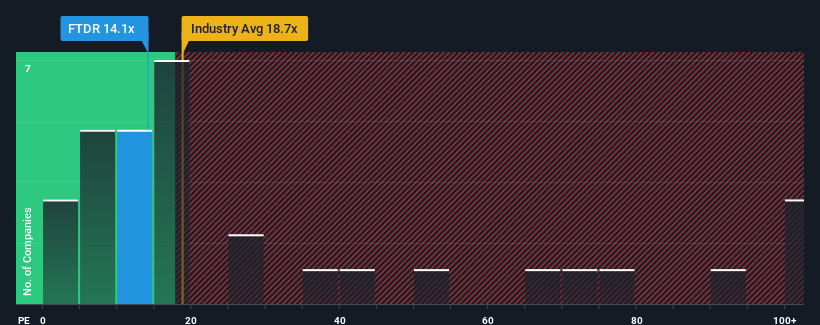- United States
- /
- Consumer Services
- /
- NasdaqGS:FTDR
Many Still Looking Away From Frontdoor, Inc. (NASDAQ:FTDR)
Frontdoor, Inc.'s (NASDAQ:FTDR) price-to-earnings (or "P/E") ratio of 14.1x might make it look like a buy right now compared to the market in the United States, where around half of the companies have P/E ratios above 17x and even P/E's above 32x are quite common. Nonetheless, we'd need to dig a little deeper to determine if there is a rational basis for the reduced P/E.
With its earnings growth in positive territory compared to the declining earnings of most other companies, Frontdoor has been doing quite well of late. One possibility is that the P/E is low because investors think the company's earnings are going to fall away like everyone else's soon. If you like the company, you'd be hoping this isn't the case so that you could potentially pick up some stock while it's out of favour.
See our latest analysis for Frontdoor

Does Growth Match The Low P/E?
Frontdoor's P/E ratio would be typical for a company that's only expected to deliver limited growth, and importantly, perform worse than the market.
Retrospectively, the last year delivered an exceptional 145% gain to the company's bottom line. The strong recent performance means it was also able to grow EPS by 66% in total over the last three years. Accordingly, shareholders would have probably welcomed those medium-term rates of earnings growth.
Turning to the outlook, the next three years should generate growth of 9.8% each year as estimated by the seven analysts watching the company. With the market predicted to deliver 10% growth per annum, the company is positioned for a comparable earnings result.
In light of this, it's peculiar that Frontdoor's P/E sits below the majority of other companies. It may be that most investors are not convinced the company can achieve future growth expectations.
The Bottom Line On Frontdoor's P/E
Typically, we'd caution against reading too much into price-to-earnings ratios when settling on investment decisions, though it can reveal plenty about what other market participants think about the company.
Our examination of Frontdoor's analyst forecasts revealed that its market-matching earnings outlook isn't contributing to its P/E as much as we would have predicted. When we see an average earnings outlook with market-like growth, we assume potential risks are what might be placing pressure on the P/E ratio. At least the risk of a price drop looks to be subdued, but investors seem to think future earnings could see some volatility.
And what about other risks? Every company has them, and we've spotted 1 warning sign for Frontdoor you should know about.
You might be able to find a better investment than Frontdoor. If you want a selection of possible candidates, check out this free list of interesting companies that trade on a low P/E (but have proven they can grow earnings).
New: AI Stock Screener & Alerts
Our new AI Stock Screener scans the market every day to uncover opportunities.
• Dividend Powerhouses (3%+ Yield)
• Undervalued Small Caps with Insider Buying
• High growth Tech and AI Companies
Or build your own from over 50 metrics.
Have feedback on this article? Concerned about the content? Get in touch with us directly. Alternatively, email editorial-team (at) simplywallst.com.
This article by Simply Wall St is general in nature. We provide commentary based on historical data and analyst forecasts only using an unbiased methodology and our articles are not intended to be financial advice. It does not constitute a recommendation to buy or sell any stock, and does not take account of your objectives, or your financial situation. We aim to bring you long-term focused analysis driven by fundamental data. Note that our analysis may not factor in the latest price-sensitive company announcements or qualitative material. Simply Wall St has no position in any stocks mentioned.
About NasdaqGS:FTDR
Frontdoor
Provides home and new home structural warranties in the United States.
Undervalued with adequate balance sheet.
Similar Companies
Market Insights
Community Narratives


Recently Updated Narratives

CoreWeave's Revenue Expected to Rocket 77.88% in 5-Year Forecast

Bisalloy Steel Group will shine with a projected profit margin increase of 12.8%

Astor Enerji will surge with a fair value of $140.43 in the next 3 years
Popular Narratives


MicroVision will explode future revenue by 380.37% with a vision towards success


NVDA: Expanding AI Demand Will Drive Major Data Center Investments Through 2026



